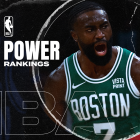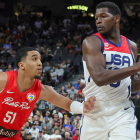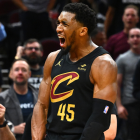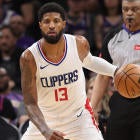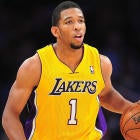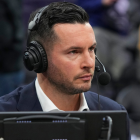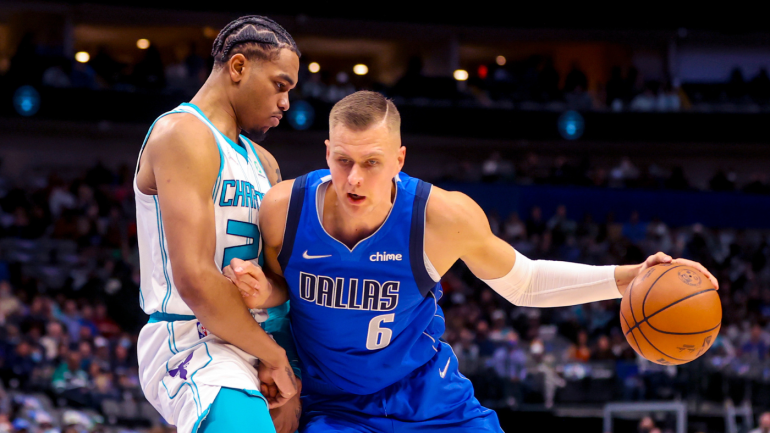
It was just three years ago that the Dallas Mavericks made a blockbuster trade that landed them Kristaps Porzingis from the New York Knicks in what was viewed as a positive deal for a franchise looking to build around its burgeoning young star in Luka Doncic. The vision was clear: pair a seven-foot All-Star who earned the nickname "unicorn" for his rare combination of skills, with a young prodigy in Doncic and continue to build around this core that had championship-contending potential.
However, since that trade in Jan. 2019, Porzingis has played in 134 of a possible 202 regular season games for the Mavericks, or 66 percent. When the seven-foot center was healthy, he was good for 20 points a night, around seven to eight rebounds and this season he returned to his fearsome rim protector ways as an anchor for Dallas' sixth-ranked defense.
But Porzingis' ability to stay healthy was a consistent issue. Even as Dallas dealt him to the Washington Wizards in a shocking move before the league's trade deadline on Thursday, he missed the last five games with a bone bruise in his right knee. Up to that point he missed 22 games of a possible 55 this season, with various injuries and a bout with COVID-19 breaking up his production. Instant reaction suggested that this was a poor trade on Dallas' end, with our own Brad Botkin giving Dallas a C grade for the deal. While on paper the deal to bring in Spencer Dinwiddie and Davis Bertans seems like a head-scratcher as both have struggled mightily this season, it's a necessary risk the Mavericks needed to make as they continue to try and build around Doncic.
With Porzingis' injury history as long as a CVS receipt, and the constant will he, won't he play tonight that surrounded the big man each time he showed up on the injury report, it makes sense why Dallas would want to move on from him. Sometimes the best ability is availability, and for a team trying to put the best pieces around its now three-time All-Star, having the second-best player on the team consistently in and out of the lineup isn't ideal. Especially when he's making over $31 million this season, and is still owed $33.8 million next year with a $36 million player option for the 2023-24 season.
Couple that with the fact that the Mavericks have not been significantly better with Porzingis and Doncic on the court as opposed to just Doncic, and you start to see that this partnership hasn't been that successful. Just this season alone, the Mavericks have gone 14-8 in the games he's missed, including a five-game win streak in January that featured victories over the Golden State Warriors, Denver Nuggets and Chicago Bulls.
Mavs record since 2019-20, including playoffs:
— StatMuse (@statmuse) February 10, 2022
.592 with Luka and Porzingis
.600 with just Luka
Pretty much the same. pic.twitter.com/lz6U3YeY6J
When speaking to the media about the trade, Mavs general manager Nico Harrison said that the deal was made in an effort to improve the team.
"It was less about his availability and more really about how do we make the team better?" Harrison said. "Because listen, I think if you look at KP, they were knick-knack injuries. If it was the playoffs, he could've played. They were like stuff that during the season, you might sit out, but in the playoffs, you would play, so I don't think they were a concern."
Team owner Mark Cuban offered a similar viewpoint on the trade, too.
"Sometimes it's the system that matters, and in order for the system to work, you've got to have people that fit different roles within a system," Cuban said via the Dallas Morning News. "KP was great within certain roles, right? And he did a lot of amazing things with us, but there were certain things that we didn't have with Timmy out, so we were able to do two for one in that respect."
Tim Hardaway Jr.'s injury certainly threw a wrench into Dallas' plans this season, and it was long reported since that injury that the Mavericks were looking to add more shooters to make up for that loss. In regards to system, while Porzingis seems like an ideal pick-and-pop teammate for Doncic, that aspect of their partnership never lived up to expectations. Doncic has found more success with Dwight Powell as a pick-and-roll partner, as the springy forward has been a solid lob threat for Doncic to go to.
In season's past, Porzingis has also talked about wanting to post-up more, and while new head coach Jason Kidd allowed him to do that this season, it hasn't generated great results. The seven-footer ranks in the 36th percentile in post-up opportunities this year, averaging just 0.887 points per possession. His 3-point shooting has also taken a sharp decline, making just 28.3 percent from deep on over five attempts a game. Despite this, though, Porzingis still possesses a unique offensive skillset for someone of his size, so you would think that trading him would actually net the Mavericks a positive return.
Instead, Dallas traded Porzingis for two distressed assets in Spencer Dinwiddie and Davis Bertans, who don't immediately make the Mavericks better right now. Dinwiddie is having an incredibly poor year for someone who was signed to a three-year, $54 million contract this past summer. He's averaged just 12.6 points with Washington, and has looked like a shell of his former self who averaged 20.6 points for the Brooklyn Nets two years ago prior to an ACL tear that kept him sidelined for all but three games last season. Bertans has been even worse, registering more DNP-CD's this season than points after signing a hefty five-year, $80 million deal with the Wizards in 2020.
But if Bertans can rehabilitate his shooting and get back to the 42 percent 3-point sniper he was two years ago, then that contract suddenly doesn't look all that bad. It also gives the Mavericks another shooter for Doncic to work with in Hardaway's absence. In regards to Dinwiddie, if he shifts back to that sixth man role off the bench he can be in complete control of the second unit and dominate the ball. There's also been this thought of Dinwiddie being insurance in case the Mavericks get priced out in trying to re-sign Jalen Brunson this summer. But for right now, if Dinwiddie can turn things around, he provides an upgrade to Trey Burke and Frank Ntilikina who are currently filling that backup guard role.
Cuban echoed that sentiment in explaining the trade for Bertans and Dinwiddie.
"We have Luka, [Jalen Brunson] and Trey [Burke, who] are really the only guys who can create off the dribble, and maybe Frank [Ntilikina] to a certain extent," Cuban said. "But now Spencer does that, so the whole idea of giving Luka a chance to rest every now and then — he's not going to want to rest, but giving him that opportunity to rest. With Timmy out, Bertans [can] space the court, gives us more space to Luka and to Trey and to JB, Spencer, whoever else is out there."

CBS Sports HQ Newsletter
Your Ultimate Guide to Every Day in Sports
We bring sports news that matters to your inbox, to help you stay informed and get a winning edge.
Thanks for signing up!
Keep an eye on your inbox.
Sorry!
There was an error processing your subscription.
The financial component of it is where it has perhaps the most positive outcome for Dallas. Porzingis is owed roughly $69.8 million over the next two years. The sum of Bertans and Dinwiddie's contracts are around $69 million, so essentially the Mavericks broke up Porzingis' deal into two smaller contracts with the players they traded for. So if Dinwiddie and Bertans improve, trading their contracts could potentially be easier down the line.
This is also about building around Doncic, who will just be turning 23 at the end of February. He hasn't even entered his prime yet, which is a scary thought considering he just dropped a career-high 51 points in a win over the Los Angeles Clippers on Thursday night. Though the Mavericks' timeline has been accelerated due to Doncic's success, it's still early to consider this team a title threat, even when Porzingis was in the lineup. If there were ever a time to pull the plug and pivot to a different path, this would be it. Though Porzingis at his best seemed to be an ideal running mate next to Doncic, it just didn't work out, and Dallas clearly didn't see the value in giving it more time to play out.
There is the risk that Porzingis balls out in Washington, in fact, Cuban said "I actually think he's going to be better with the Wizards than he was with us," after the trade was made. But it was clear that the partnership between Doncic and Porzingis wasn't as fruitful as the Mavericks expected it to be. Though the return isn't what you would expect for a max-contract player who is averaging just shy of 20 points a game, the league clearly viewed Porzingis as a negative asset. Dallas could've waited until the summer to see what better deal could be out there, but doing it now signals that the Mavericks just wanted to end this era. It's a risky move to make after going all-in on Porzingis three years ago, but getting off his contract now could make building around Doncic easier down the line.














